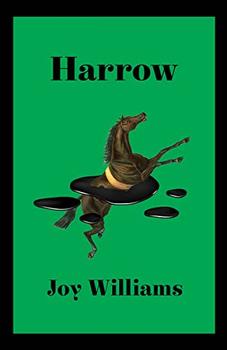Summary | Excerpt | Reviews | Beyond the Book | Read-Alikes | Genres & Themes | Author Bio

A novel
by Joy WilliamsThis article relates to Harrow
 In Joy Williams' Harrow, two characters discuss Franz Kafka's "The Hunter Gracchus," a short story written in 1917 and published posthumously in 1931, along with a document that was marked as a fragment, which appears to be an addendum to the story.
In Joy Williams' Harrow, two characters discuss Franz Kafka's "The Hunter Gracchus," a short story written in 1917 and published posthumously in 1931, along with a document that was marked as a fragment, which appears to be an addendum to the story.
Franz Kafka was born into a well-to-do Jewish family on July 3, 1883 in Prague. He had considerable conflict with his father growing up and throughout his life and wrote extensively about his father's "intellectual domination," temper, and habit of crushing all enthusiasm out of his son. Kafka went on to study law at the University of Prague and worked as a law clerk for a year. Whatever he did, life with his father was simply too oppressive.
Kafka wanted to move to Berlin, where his fiancée, Felice Bauer, was living. He was fascinated by the art and culture there and was planning to relocate when World War I broke out. He and Bauer broke off their relationship in 1917.
The year in which he wrote "The Hunter Gracchus" was an especially bad one for the young author, who was already accustomed to long bouts of depression. Without the support of Bauer, everyday life became much harder. Kafka's anxiety and depression worsened, as did his physical health, and he was diagnosed with tuberculosis.
Kafka did finally make it to Berlin in 1923, though he'd been sensing growing anti-Semitism throughout Europe. In Berlin, he lived with Dora Diamant, an out-of-wedlock cohabitation that annoyed her rabbi father to no end. Kafka wrote home often, frequently exaggerating his happiness. Tragically, he also enlisted Diamant to help him burn an estimated 90% of his writings. After the author's death in 1925, his literary executor Max Bord was supposed to destroy everything else. Instead, he began publishing Kafka's work, even finishing what was incomplete, including all of his novels. Bord and Diamant worked to preserve what they could, but some of Kafka's notebooks were confiscated by the Gestapo. Most have since been found and are now held in the National Library in Jerusalem in accordance with Max Bord's will.
Thus, it's been difficult to collect the author's writing and to develop a comprehensive picture of the man himself. It's certainly possible that his most famous works weren't representative of his philosophy or person as a whole. Still, it's easy to see in them the young man forever trying to escape his father's oppression and falling into a state of sickness, heartbreak and self-loathing.
These themes are present in "The Hunter Gracchus." In the story, the long-dead Hunter Gracchus arrives via boat to the port city of Riva in Italy. There, he meets the burgomaster (comparable to a mayor) and explains his lot. He was killed in a hunting accident, he says, but his death ship got turned around, and he's just been roaming the seas since then. "I am always on the immense staircase leading up to [the afterlife]," he tells the burgomaster.
This story ties neatly into the themes of Harrow, which questions living in this in-between state. The novel features references to not only "The Hunter Gracchus" but also Gogol's "The Overcoat," about a ghost wandering the earth still fixated on the woes of his life, and the Biblical Enoch, who enters heaven while still alive.
While Kafka is known for existential horror, some critics argue that this reading is too narrow and that Kafka's humor is commonly lost on people. Joy Williams' humor might also be missed due to the heavier themes in her novels. In Harrow, her characters contemplate "The Hunter Gracchus," even rewriting it and adding to it. Perhaps, then, Harrow and "The Hunter Gracchus" are the same story, shedding fragments as it endlessly roams the world.
Franz Kafka, 1923, courtesy of Franz Kafka Museum
Filed under Books and Authors
![]() This "beyond the book article" relates to Harrow. It originally ran in October 2021 and has been updated for the
July 2022 paperback edition.
Go to magazine.
This "beyond the book article" relates to Harrow. It originally ran in October 2021 and has been updated for the
July 2022 paperback edition.
Go to magazine.
Your guide toexceptional books
BookBrowse seeks out and recommends the best in contemporary fiction and nonfiction—books that not only engage and entertain but also deepen our understanding of ourselves and the world around us.